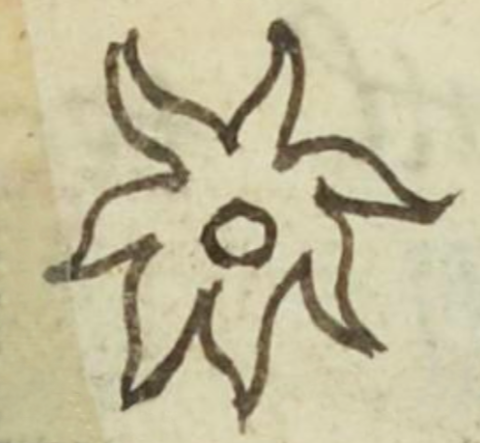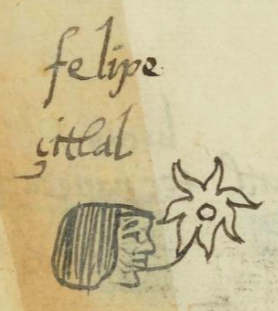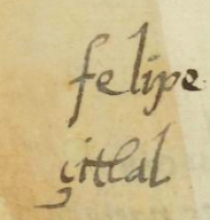Citlal (MH506v)
This black-line drawing of the simplex glyph for a star (citlalin) stands for the personal name Citlal (attested here as male). This star is shaped something like a flower, with a round center floating in the middle and seven somewhat curvy points.
Stephanie Wood
This glyph of a star seems highly influenced by European traditions. Stars in the Codex Mendoza, for example, are small white dots on a black background, as found on folio 17 verso in the compound glyph for Citlaltepec. Or, stars can be eyes that see at night, as in the yohualli glyph on folio 39 recto. Instead, this glyph is remarkably like the tepozahuatl (from tepoz-, metal, and ahuatl, spine) glyph that appears several times in the Matrícula de Huexotzinco. Juan José Batalla Rosado (2018, 89–90) translates tepozahuatl as "spur," an innovation for Mesoamerica that came with the re-introduction of horses. The tepozahuatl glyphs on folios 568r, 574r, and 605v all echo this glyph here. So, for this tlacuilo, to think of a star was apparently to think of the shape of a spur. Spurs are, of course, attached to a boot with another piece of metal, and the connection is at the center of the spur, which may explain the central circle of the glyph. But it is not inconceivable for a star to have a center from which points emanate if we think of the glyph for the sun (see below). One last glyph reproduced by Batalla that strongly echoes the start glyph here is one of the glyphs for Mazahuatl, an ethnic group (see folio 517 verso, in the MH). As he shows, the usual representation for this ethnicity is a deer (mazatl) with many spines (ahuatl) coming out of it. So, the one glyphs that resembles this star is a representation of a circle of spines. Again, the thinking about a star among the Nahuas of Huexotzinco seems to be very different from the capital or it has evolved significantly with European influence.
Stephanie Wood
felipe
çitlal
Felipe Citlal
Stephanie Wood
1560
Jeff Haskett-Wood
stars, estrellas, spurs, espuelas, espinas

citlal(in), star, https://nahuatl.wired-humanities.org/content/citlalin-2
La Estrella
Stephanie Wood
Matrícula de Huexotzinco, folio 506v, World Digital Library, https://www.loc.gov/resource/gdcwdl.wdl_15282/?sp=92&st=image
This manuscript is hosted by the Library of Congress and the World Digital Library; used here with the Creative Commons, “Attribution-NonCommercial-ShareAlike 3.0 License” (CC-BY-NC-SAq 3.0).





